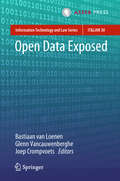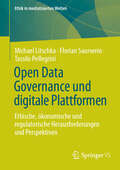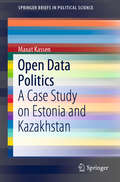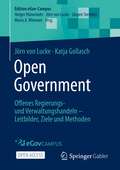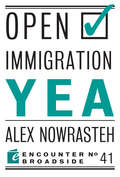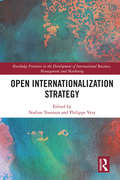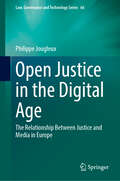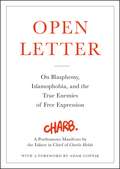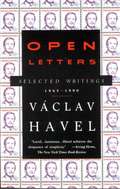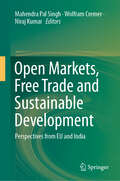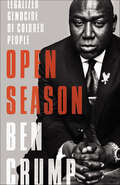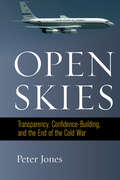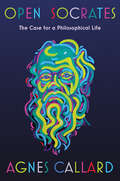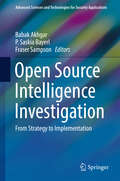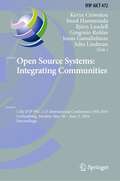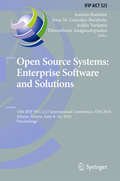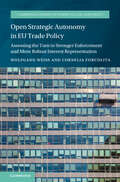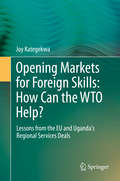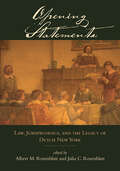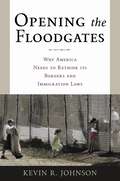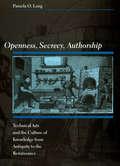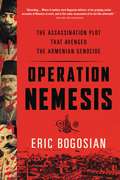- Table View
- List View
Open Data Exposed (Information Technology and Law Series #30)
by Joep Crompvoets Bastiaan Van Loenen Glenn VancauwenbergheThe main objectives of this book are to expose key aspects that have a relevance when dealing with open data viewed from different perspectives and to provide appealing examples of how open data is implemented worldwide.The concept of open data as we know it today is the result of many different initiatives, both of a legislative and non-legislative nature, and promoted by a wide range of actors. Numerous regulatory antecedents to foster the concept of open data and embed it in national and international policy agendas have been undertaken on both sides of the Atlantic, as well as at a supranational level. The book highlights a number of the efforts made to promote open data in Europe, Asia and the United States. In addition to new insights, practical guidance and multiple disciplinary perspectives on open data, the book also addresses the transformation of current developments towards open data, which may be referred to as the democratisation of data. This book will support open data practitioners as well as open data scholars in their endeavours to promote open data implementation and research.Bastiaan van Loenen is associate professor and director of the Knowledge Centre Open Data at the Faculty of Architecture and The Built Environment of Delft University of Technology in the Netherlands, as is Glenn Vancauwenberghe, who is a post-doctoral researcher, and Joep Crompvoets is a professor at the Public Governance Institute of the KU Leuven in Belgium.
Open Data Governance und digitale Plattformen: Ethische, ökonomische und regulatorische Herausforderungen und Perspektiven (Ethik in mediatisierten Welten)
by Tassilo Pellegrini Michael Litschka Florian SaurweinDieses Buch behandelt ethische, ökonomische und regulatorische Aspekte der Open Data Governance bei digitalen Plattformen. Wie Unternehmen der digitalen Ökonomie mit offenen Daten umgehen, wirft viele gesellschaftlich relevante Fragen auf: Wie können offene Daten und der darauf beruhende Content möglichst weit in der Bevölkerung verbreitet werden? Wie kann Content Moderation transparent organisiert und wie können Dateninfrastrukturen sozial erwünscht gestaltet werden? Das Buch analysiert die Fallstudien offene digitale Public-Value Plattformen, offene digitale Dateninfrastrukturen und Content Moderation und Kuratierung auf digitalen Plattformen und entwickelt Governance-Modelle, die eine Beurteilung verschiedener Regulierungsmöglichkeiten für Unternehmen der digitalen Plattformökonomie ermöglichen.
Open Data Politics: A Case Study on Estonia and Kazakhstan (SpringerBriefs in Political Science)
by Maxat KassenThis book offers a cross-national comparison of open data policies in Estonia and Kazakhstan. By analyzing a broad range of open data-driven projects and startups in both countries, it reveals the potential that open data phenomena hold with regard to promoting public sector innovations. The book addresses various political and socioeconomic contexts in these two transitional societies, and reviews the strategies and tactics adopted by policymakers and stakeholders to identify drivers of and obstacles to the implementation of open data innovations. Given its scope, the book will appeal to scholars, policymakers, e-government practitioners and open data entrepreneurs interested in implementing and evaluating open data-driven public sector projects.
Open Government: Offenes Regierungs- und Verwaltungshandeln – Leitbilder, Ziele und Methoden (Edition eGov-Campus)
by Jörn von Lucke Katja GollaschDieses Buch – eine Open-Access-Publikation mit freiem Online-Zugang – bietet Führungskräften und Mitarbeitenden im öffentlichen Sektor sowie Studierenden eine ebenso kompakte wie kompetente Einführung in die wesentlichen Aspekte von Open Government. Das Konzept Open Government (offenes Regierungs- und Verwaltungshandeln) beschreibt einen Kulturwandel von Politik und Verwaltung hin zu mehr Transparenz, Partizipation der Zivilgesellschaft und Zusammenarbeit innerhalb des öffentlichen Sektors als auch mit Akteuren aus Wirtschaft und Wissenschaft. Durch die Digitalisierung und des Angebots offener Daten ergeben sich für Politik und Verwaltung neue Möglichkeiten der Interaktion und der Offenlegung von Entscheidungen. Das Buch bietet einen kompakten Einstieg in Themen wie Transparenz, Bürgerbeteiligung, Zusammenarbeit sowie der Öffnung von Datenbeständen. Ebenso wird die Teilnahme Deutschlands an der Open Government Partnership vorgestellt. Durch direkte Verlinkungen auf vorbildhafte Beispiele für ein offenes Regierungs- und Verwaltungshandeln in der Praxis sowie ein digitales Karteikartensystem wird umfangreiches Wissen anschaulich und zielgerecht vermittelt.Die Leser werden mit Leitbildern, Zielen und Methoden im Bereich Open Government vertraut gemacht und können diese kritisch reflektieren Im Sinne von Offenheit ist dieses Werk eine Open-Access-Publikation mit freiem Online-Zugang.Aus dem InhaltOpen Government – Grundlagen eines offenen Regierungs- und Verwaltungshandelns Transparenz 2.0Offene Daten und offene Verwaltungsdaten – Öffnung von DatenbeständenOpen Budget – Öffnung des HaushaltswesensBürgerbeteiligung 2.0 Zusammenarbeit 2.0Aktivitäten Deutschlands in der Open Government PartnershipInklusive kostenlosem Online-Wissens-Quiz mit der Springer Nature Flashcards-App - laden Sie die App im App-Store; geben Sie den Code 7C174-C91BD-C687A-B7DAE-FE989 ein, um den Online-Quiz zu laden
Open Immigration: Yea & Nay
by Mark Krikorian Alex NowrastehOpen Immigration: Yea by Alex NowrastehExtensive immigration restrictions are an attempt by the U.S. government to centrally manage the demographics, labor market, and culture of the United States instead of letting those facets of our society develop naturally - as they have throughout most of history. Many objections have been raised against a return to America's traditional free-immigration policy, but they are without merit and ignore immigration's tremendous benefits.In this Broadside, Alex Nowrasteh explains how a policy of open immigration is consistent with America's founding principles, the ideals of a free society, and the foundation of a free-market economy. Immigration restrictions should be based on protecting the life, liberty, and private property of Americans from those who are most likely to infringe upon them. A freer immigration system would not only be economically beneficial to the United States, but it would also be consistent with American values.Open Immigration: Nay by Mark KrikorianImmigration has always been an important part of America's story. Over the past century, however, the United States has seen drastic changes - in government spending, the economy, technology, security, and assimilation - and the needs of the nation have changed. Mass immigration is no longer compatible with those needs. In this Broadside, Mark Krikorian argues that the federal immigration program needs to adjust to the realities of modern America by scaling back the number of newcomers who are allowed to settle in the country. While this doesn't mean zero immigration, it does mean that we must evaluate and permit only the most compelling cases. What worked in the past will not work today, and our immigration policies must change in response to new circumstances.
Open Internationalization Strategy (Routledge Frontiers in the Development of International Business, Management and Marketing)
by Nadine Tournois; Philippe VeryOpen internationalization is a concept that brings a new perspective on the process of firm internationalization. As theories of internationalization show, some companies expand abroad only on their own, known as closed internationalization, while others combine their resources with those of other firms or use their networks for facilitating foreign implantation, known as open internationalization. Parallel to the development of the well-known concept of open innovation, open internationalization can be conceived as a meta-model for understanding companies’ expansion abroad. This book gathers a selection of contemporary research works dedicated to open internationalization, either seen as a way to analyze expansion in foreign countries, or as a way to investigate the management of geographically dispersed activities. All the authors of the chapters are researchers specialized in the internationalization field. Readers will benefit from this new lens for understanding, studying or practising international business, from the decision to go abroad to its implementation and its efficiency. Open Internationalization Strategy includes both academic empirical investigations and literature reviews on specific topics, making it valuable to researchers, academics, managers, and students in the fields of business and management history, international business, organizational studies, and economics.
Open Justice in the Digital Age: The Relationship Between Justice and Media in Europe (Law, Governance and Technology Series #66)
by Philippe JougleuxThis book discusses the principle of open justice with a focus on the mechanism of video streaming of court proceedings. The principle of open justice is multidimensional and involves both the human right to a fair trial and freedom of expression. The book distinguishes between three components of open justice: public hearings, media coverage of proceedings, and publication of judgments. All three have been and/or could be substantially affected by the digital revolution: public hearings could benefit from video streaming, the media coverage from social media, and the publication of judgments from online databases. The book analyses recent advances and challenges related to the digitalization of open justice. Particular attention is paid to the relevant case law of European courts, to the impact of the GDPR with an emphasis on the sensitive issue of pseudonymizing judgments, and to a comparison of various national practices. Although the book’s primary focus is on European law, it will also be of interest to scholars from other continents, either for purposes of comparative research, or because the topic itself touches on general theory of law issues.
Open Letter: On Blasphemy, Islamophobia, and the True Enemies of Free Expression
by Adam Gopnik CharbAn impassioned defense of the freedom of speech, from Stéphane Charbonnier, a journalist murdered for his convictionsOn January 7, 2015, two gunmen stormed the offices of the French satirical newspaper Charlie Hebdo. They took the lives of twelve men and women, but they called for one man by name: "Charb." Known by his pen name, Stéphane Charbonnier was editor in chief of Charlie Hebdo, an outspoken critic of religious fundamentalism, and a renowned political cartoonist in his own right. In the past, he had received death threats and had even earned a place on Al Qaeda's "Most Wanted List." On January 7 it seemed that Charb's enemies had finally succeeded in silencing him. But in a twist of fate befitting Charb's defiant nature, it was soon revealed that he had finished a book just two days before his murder on the very issues at the heart of the attacks: blasphemy, Islamophobia, and the necessary courage of satirists. Here, published for the first time in English, is Charb's final work. A searing criticism of hypocrisy and racism, and a rousing, eloquent defense of free speech, Open Letter shows Charb's words to be as powerful and provocative as his art. This is an essential book about race, religion, the voice of ethnic minorities and majorities in a pluralistic society, and above all, the right to free expression and the surprising challenges being leveled at it in our fraught and dangerous time.
Open Licensing Playbook
by U.S. Department of StateFederal Open Licensing Playbook, a list of considerations, use cases, and recommendations for federal departments interested in developing and implementing open license requirements on federally-funded grant projects. It is designed to assist federal efforts to maximize the impact of grant funds, and create opportunities for innovation and collaborative practices using federally-funded resources.
Open Markets, Free Trade and Sustainable Development: Perspectives from EU and India
by Niraj Kumar Mahendra Pal Singh Wolfram CremerThis book explores the dilemmas posed by globalisation in various aspects of law. It covers diverse themes, ranging from the impact of different legislative measures, bilateral and regional agreements in the context of trade, investment and mobility of labour, to concerns about sustainability, equity, regional balance and social security in the light of globalisation. Although it focuses mainly on India and the European Union, the issues raised and challenges discussed are of a general nature, and as such relevant in the broader context. The chapters address contemporary problems in trade, investment and labour mobility, which have emerged through the complex interaction of market, state policies and socio-environmental concerns, and are expressed on national and global platforms in the context of evolving legal system. The book is a valuable resource for students, researchers and academics engaged in comparative legal studies, particularly those interested in studying the interplay of globalisation with various areas and aspects of law at national as well as international levels. It also appeals to anyone interested in law and policy studies.
Open Season: Legalized Genocide of Colored People
by Ben CrumpGenocide—the intent to destroy in whole or in part, a group of people.TIME's 42 Most Anticipated Books of Fall 2019Book Riot's 50 of the Best Books to Read This FallAs seen on CBS This Morning, award-winning attorney Ben Crump exposes a heinous truth in Open Season: Whether with a bullet or a lengthy prison sentence, America is killing black people and justifying it legally. While some deaths make headlines, most are personal tragedies suffered within families and communities. Worse, these killings are done one person at a time, so as not to raise alarm. While it is much more difficult to justify killing many people at once, in dramatic fashion, the result is the same—genocide.Taking on such high-profile cases as George Floyd, Ahmaud Arbery, Breonna Taylor, Trayvon Martin, Michael Brown, and a host of others, Crump witnessed the disparities within the American legal system firsthand and learned it is dangerous to be a black man in America—and that the justice system indeed only protects wealthy white men.In this enlightening and enthralling work, he shows that there is a persistent, prevailing, and destructive mindset regarding colored people that is rooted in our history as a slaveowning nation. This biased attitude has given rise to mass incarceration, voter disenfranchisement, unequal educational opportunities, disparate health care practices, job and housing discrimination, police brutality, and an unequal justice system. And all mask the silent and ongoing systematic killing of people of color.Open Season is more than Crump’s incredible mission to preserve justice, it is a call to action for Americans to begin living up to the promise to protect the rights of its citizens equally and without question.
Open Skies: Transparency, Confidence-Building, and the End of the Cold War
by Peter JonesThis book recounts and analyzes the history of one of the best-kept diplomatic and security secrets of the last half-century#151;the Open Skies Treaty: a treaty that allows the U. S. , the Russian Federation, and over 30 other signatories to fly unarmed reconnaissance aircraft over one another's territory. First proposed by President Eisenhower in 1955, shelved by succeeding administrations, re-launched by President George H. W. Bush in 1989, and finally ratified in 2002, the Treaty has been one of the most important security instruments of the 21st century#151;with over 1,000 flights logged to date providing confidence for the governments, intelligence communities, and militaries of former and potential adversaries. Written by a professor and former diplomat who was deeply involved in the negotiations of the Open Skies Treaty from 1989 to 1995, this book is a meticulous work of political history that explores how Open Skies affected, and was affected by, the extraordinary times of its negotiation#151;during which the Cold War ended and the Soviet Union collapsed. But it is also a potential blueprint for future applications of the Open Skies concept by providing insights into the role that cooperative aerial monitoring can play in helping to transform other difficult relationships around the world. As such it will serve as a negotiation handbook for diplomats, bureaucrats, and politicians and as a case-study textbook for IR students and students of diplomacy.
Open Socrates: The Case for a Philosophical Life
by Agnes CallardAn iconoclastic philosopher revives Socrates for our time, showing how we can answer—and, in the first place, ask—life’s most important questions. Socrates has been hiding in plain sight. We call him the father of Western philosophy, but what exactly are his philosophical views? He is famous for his humility, but readers often find him arrogant and condescending. We parrot his claim that “the unexamined life is not worth living,” yet take no steps to live examined ones. We know that he was tried, convicted, and executed for “corrupting the youth,” but freely assign Socratic dialogues to today’s youths, to introduce them to philosophy. We’ve lost sight of what made him so dangerous. In Open Socrates, acclaimed philosopher Agnes Callard recovers the radical move at the center of Socrates’ thought, and shows why it is still the way to a good life. Callard draws our attention to Socrates’ startling discovery that we don’t know how to ask ourselves the most important questions—about how we should live, and how we might change. Before a person even has a chance to reflect, their bodily desires or the forces of social conformity have already answered on their behalf. To ask the most important questions, we need help. Callard argues that the true ambition of the famous “Socratic method” is to reveal what one human being can be to another. You can use another person in many ways—for survival, for pleasure, for comfort—but you are engaging them to the fullest when you call on them to help answer your questions and challenge your answers. Callard shows that Socrates’ method allows us to make progress in thinking about how to manage romantic love, how to confront one’s own death, and how to approach politics. In the process, she gives us nothing less than a new ethics to live by.
Open Source Intelligence Investigation: From Strategy to Implementation (Advanced Sciences and Technologies for Security Applications)
by Babak Akhgar, P. Saskia Bayerl and Fraser SampsonOne of the most important aspects for a successful police operation is the ability for the police to obtain timely, reliable and actionable intelligence related to the investigation or incident at hand. Open Source Intelligence (OSINT) provides an invaluable avenue to access and collect such information in addition to traditional investigative techniques and information sources. This book offers an authoritative and accessible guide on how to conduct Open Source Intelligence investigations from data collection to analysis to the design and vetting of OSINT tools. In its pages the reader will find a comprehensive view into the newest methods for OSINT analytics and visualizations in combination with real-life case studies to showcase the application as well as the challenges of OSINT investigations across domains. Examples of OSINT range from information posted on social media as one of the most openly available means of accessing and gathering Open Source Intelligence to location data, OSINT obtained from the darkweb to combinations of OSINT with real-time analytical capabilities and closed sources. In addition it provides guidance on legal and ethical considerations making it relevant reading for practitioners as well as academics and students with a view to obtain thorough, first-hand knowledge from serving experts in the field.
Open Source Systems: 12th IFIP WG 2.13 International Conference, OSS 2016, Gothenburg, Sweden, May 30 - June 2, 2016, Proceedings (IFIP Advances in Information and Communication Technology #472)
by Kevin Crowston Imed Hammouda Björn Lundell Gregorio Robles Jonas Gamalielsson Juho LindmanThis book constitutes the refereed proceedings of the 12th International IFIP WG 2.13 International Conference on Open Source Systems, OSS 2016, held in Gothenburg, Sweden, in May/June 2016. The 13 revised full papers presented were carefully reviewed and selected from 38 submissions. The papers cover a wide range of topics related to free, libre, and open source software, including: organizational aspects of communities; organizational adoption; participation of women; software maintenance and evolution; open standards and open data; collaboration; hybrid communities; code reviews; and certification.
Open Source Systems: 14th IFIP WG 2.13 International Conference, OSS 2018, Athens, Greece, June 8-10, 2018, Proceedings (IFIP Advances in Information and Communication Technology #525)
by Ioannis Stamelos Jesus M. Gonzalez-Barahoña Iraklis Varlamis Dimosthenis AnagnostopoulosThis book constitutes the refereed proceedings of the 14th IFIP WG 2.13 International Conference on Open Source Systems, OSS 2018, held in Athens, Greece, in June 2018.The 14 revised full papers and 2 short papers presented were carefully reviewed and selected from 38 submissions. The papers cover a wide range of topics in the field of free/libre open source software (FLOSS) and are organized in the following thematic sections: organizational aspects of OSS projects, OSS projects validity, mining OSS data, OSS in public administration, OSS governance, and OSS reusability.
Open Strategic Autonomy in EU Trade Policy: Assessing the Turn to Stronger Enforcement and More Robust Interest Representation (Cambridge Studies in European Law and Policy)
by Wolfgang Weiß Cornelia FurculitaThis book analyses whether the recent reorientation of EU trade policy towards stronger enforcement and more robust representation of interests, resulting in a series of new or amended legislative tools, is in conformity with the EU's international commitments, particularly WTO, FTA, environmental, and general international law, and with its multilateralist stance and underlying constitutional obligations. The analysis is also set against the consequences that would flow from within the EU legal order, providing readers with a comprehensive view of the external and internal constraints on trade policy that the EU should respect, as well as the leeway it enjoys. In case of potential tensions, it submits changes that would better balance the EU's new ambitions and international obligations. Furthermore, the book looks beyond the possible legal repercussions to consider the broader political implications of these instruments on the credibility of the EU's commitment to multilateralism and international law.
Open for Business: Conservatives' Opposition to Environmental Regulation
by Judith A. LayzerSince the 1970s, conservative activists have invoked free markets and distrust of the federal government as part of a concerted effort to roll back environmental regulations. They have promoted a powerful antiregulatory storyline to counter environmentalists' scenario of a fragile earth in need of protection, mobilized grassroots opposition, and mounted creative legal challenges to environmental laws. But what has been the impact of all this activity on policy? In this book, Judith Layzer offers a detailed and systematic analysis of conservatives' prolonged campaign to dismantle the federal regulatory framework for environmental protection. Examining conservatives' influence from the Nixon era to the Obama administration, Layzer describes a set of increasingly sophisticated tactics--including the depiction of environmentalists as extremist elitists, a growing reliance on right-wing think tanks and media outlets, the cultivation of sympathetic litigators and judges, and the use of environmentally friendly language to describe potentially harmful activities. She argues that although conservatives have failed to repeal or revamp any of the nation's environmental statutes, they have influenced the implementation of those laws in ways that increase the risks we face, prevented or delayed action on newly recognized problems, and altered the way Americans think about environmental problems and their solutions. Layzer's analysis sheds light not only on the politics of environmental protection but also, more generally, on the interaction between ideas and institutions in the development of policy.
Opening Arguments
by Jeffrey ToobinIn January of 1987 Jeffrey Toobin is fresh out of Harvard Law School, and appointed the youngest lawyer on Special Prosecutor Lawrence Walsh's team to investigate and try the leading figure in the Iran-Contra affair--Oliver North. For twenty-eight thrilling months, Toobin served on Walsh's staff and came of age into his profession. Toobin's first book and immersive account of that period is the story of a young man's awakening to the realities of law and a policial, legal and moral drama on a grand stage. Through this defining case of the 1980s--which featured obstruction of justice, diversion of funds, and personal corruption--Opening Arguments shows the judicial process at work. The Congressional Iran-Contra committees granted the key figures of the trial immunity, so Toobin and his colleagues had to work in the dark, without accesss to newspapers or television for weeks at a time. The Reagan Justice Department provided difficulties too. On page after page, Toobin illuminates these battles against long odds, portraying the climactic North trial itself with the eye of a novelist. Like a morality tale with few losers and no real winners, Bill Moyers calls Opening Arguments "a valuable account of how politics and law entwined in the Iran-Contra trials... Reading it can be a citizen's education, too."
Opening Markets for Foreign Skills: How Can the WTO Help?
by Joy KategekwaThe Mode 4 commitments of WTO Members are narrow and shallow. Even though trade negotiations for enhanced Mode 4 access started well before the launch of the DDA- prospects for success are thin. These negotiations followed a traditional mercantilist approach- with limited attention to the underlying difficulties countries face in letting people into their borders, either generally, or on the basis of a WTO GATS commitment. This Book argues that this approach alone will not succeed. It proposes a focus not on trading market access concessions only, but on discussions aimed at understanding each other's regulatory approaches. To date, in terms of the literature available, we know very little about how WTO Members are managing their Mode 4 commitments. We know even less about how the WTO could learn from clearly more advanced steps in regional liberalization processes. This Book addresses these issues- through case studies of market access and national treatment commitments, and regulatory approaches in Economic Integration Agreements of a select group of WTO Members.
Opening Statements: Law, Jurisprudence, and the Legacy of Dutch New York (Excelsior Editions)
by Albert M. Rosenblatt Julia C. RosenblattNo society can function without laws, that set of established practices and expectations that guide the way people get along with one another and relate to ruling authorities. Although much has been written about the English roots of American law and jurisprudence, little attention has been paid until recently to the legacy left by the Dutch. In Opening Statements, a broad spectrum of eminent scholars examine the legal heritage that New Netherland bequeathed to New York in the seventeenth century. Even after the transfer of the colony to England placed New York under English Common Law rather than Dutch Roman Law, the Dutch system of jurisprudence continued to influence evolving American concepts of governance, liberty, women's rights, and religious freedom in ways that still resonate in today's legal culture."Opening Statements addresses only a short chapter in the long history of America. Its judgments will not be without dispute, but then, as the eminent Dutch historian Pieter Geyl once wrote: 'History is an argument without end.' There can be no doubt, however, as to the value of those seeds of freedom that were deeply planted in New Netherland. They produced a revolutionary harvest that causes us to appreciate what the Dutch inspired. A small country, the Netherlands—yes—but always a powerful ally for America in the unending struggle for a well-ordered society where freedom and justice prevail." — from the Foreword by William J. vanden Heuvel
Opening the Floodgates: Why America Needs to Rethink its Borders and Immigration Laws (Critical America #80)
by Kevin R. JohnsonSeeking to re-imagine the meaning and significance of the international border, Opening the Floodgates makes a case for eliminating the border as a legal construct that impedes the movement of people into this country.Open migration policies deserve fuller analysis, as evidenced by President Barack Obama’s pledge to make immigration reform a priority. Kevin R. Johnson offers an alternative vision of how U.S. borders might be reconfigured, grounded in moral, economic, and policy arguments for open borders. Importantly, liberalizing migration through an open borders policy would recognize that the enforcement of closed borders cannot stifle the strong, perhaps irresistible, economic, social, and political pressures that fuel international migration.Controversially, Johnson suggests that open borders are entirely consistent with efforts to prevent terrorism that have dominated immigration enforcement since the events of September 11, 2001. More liberal migration, he suggests, would allow for full attention to be paid to the true dangers to public safety and national security.
Openness, Secrecy, Authorship: Technical Arts and the Culture of Knowledge from Antiquity to the Renaissance
by Pamela O. LongA history of the book and intellectual property that includes military technology and military secrets.Winner of The Morris D. Forkosch Prize from the Journal of the History of IdeasIn today's world of intellectual property disputes, industrial espionage, and book signings by famous authors, one easily loses sight of the historical nature of the attribution and ownership of texts. In Openness, Secrecy, Authorship: Technical Arts and the Culture of Knowledge from Antiquity to the Renaissance, Pamela Long combines intellectual history with the history of science and technology to explore the culture of authorship. Using classical Greek as well as medieval and Renaissance European examples, Long traces the definitions, limitations, and traditions of intellectual and scientific creation and attribution. She examines these attitudes as they pertain to the technical and the practical. Although Long's study follows a chronological development, this is not merely a general work. Long is able to examine events and sources within their historical context and locale. By looking at Aristotelian ideas of Praxis, Techne, and Episteme. She explains the tension between craft and ideas, authors and producers. She discusses, with solid research and clear prose, the rise, wane, and resurgence of priority in the crediting and lionizing of authors. Long illuminates the creation and re-creation of ideas like "trade secrets," "plagiarism," "mechanical arts," and "scribal culture." Her historical study complicates prevailing assumptions while inviting a closer look at issues that define so much of our society and thought to this day. She argues that "a useful working definition of authorship permits a gradation of meaning between the poles of authority and originality," and guides us through the term's nuances with clarity rarely matched in a historical study.
Operation Nemesis: The Assassination Plot that Avenged the Armenian Genocide
by Eric BogosianA masterful account of the assassins who hunted down the perpetrators of the Armenian GenocideIn 1921, a tightly knit band of killers set out to avenge the deaths of almost one million victims of the Armenian Genocide. They were a humble bunch: an accountant, a life insurance salesman, a newspaper editor, an engineering student, and a diplomat. Together they formed one of the most effective assassination squads in history. They named their operation Nemesis, after the Greek goddess of retribution. The assassins were survivors, men defined by the massive tragedy that had devastated their people. With operatives on three continents, the Nemesis team killed six major Turkish leaders in Berlin, Constantinople, Tiflis, and Rome, only to disband and suddenly disappear. The story of this secret operation has never been fully told, until now. Eric Bogosian goes beyond simply telling the story of this cadre of Armenian assassins by setting the killings in the context of Ottoman and Armenian history, as well as showing in vivid color the era's history, rife with political fighting and massacres. Casting fresh light on one of the great crimes of the twentieth century and one of history's most remarkable acts of vengeance, Bogosian draws upon years of research and newly uncovered evidence. Operation Nemesis is the result--both a riveting read and a profound examination of evil, revenge, and the costs of violence.
